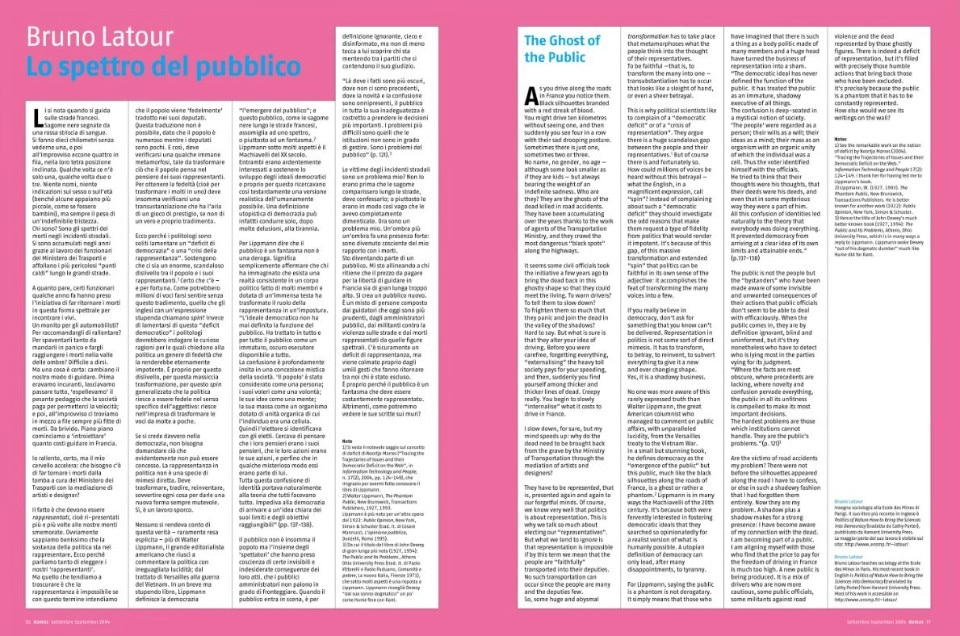This editorial was published on Domus 873 in September 2004.
As you drive along the roads in France you notice them. Black silhouettes branded with a red streak of blood.You might drive ten kilometres without seeing one, and then suddenly you see four in a row with their sad drooping posture. Sometimes there is just one, sometimes two or three. No name, no gender, no age — although some look smaller as if they are kids — but always bearing the weight of an indefinite sadness. Who are they? They are the ghosts of the dead killed in road accidents. They have been accumulating over the years thanks to the work of agents of the Transportation Ministry, and they crowd the most dangerous “black spots” along the highways.
It seems some civil officials took the initiative a few years ago to bring the dead back in this ghostly shape so that they could meet the living. To warn drivers? To tell them to slow down? To frighten them so much that they panic and join the dead in the valley of the shadows? Hard to say. But what is sure is that they alter your idea of driving. Before you were carefree, forgetting everything, “externalising” the heavy toll society pays for your speeding, and then, suddenly you find yourself among thicker and thicker lines of dead. Creepy really. You begin to slowly “internalise” what it costs to drive in France.
I slow down, for sure, but my mind speeds up: why do the dead need to be brought back from the grave by the Ministry of Transportation through the mediation of artists and designers?
They have to be represented, that is, presented again and again to our forgetful minds. Of course, we know very well that politics is about representation. This is why we talk so much about electing our “representatives”. But what we tend to ignore is that representation is impossible if by this term we mean that the people are “faithfully” transported into their deputies. No such transportation can occur since the people are many and the deputies few. So, some huge and abysmal transformation has to take place that metamorphoses what the people think into the thought of their representatives.

To be faithful — that is, to transform the many into one — transubstantiation has to occur that looks like a sleight of hand, or even a sheer betrayal.
This is why political scientists like to complain of a “democratic deficit” or of a “crisis of representation”. They argue there is a huge scandalous gap between the people and their representatives. But of course there is and fortunately so. How could millions of voices be heard without this betrayal — what the English, in a magnificent expression, call “spin”? Instead of complaining about such a “democratic deficit” they should investigate the odd reasons that make them request a type of fidelity from politics that would render it impotent. It’s because of this gap, of this massive transformation and extended “spin” that politics can be faithful in its own sense of the adjective: it accomplishes the feat of transforming the many voices into a few.
If you really believe in democracy, don’t ask for something that you know can’t be delivered. Representation in politics is not some sort of direct mimesis. It has to transform, to betray, to reinvent, to subvert everything to give it a new and ever changing shape. Yes, it is a shadowy business.
No one was more aware of this rarely expressed truth than Walter Lippmann, the great American columnist who managed to comment on public affairs, with unparalleled lucidity, from the Versailles treaty to the Vietnam War. In a small but stunning book, he defines democracy as the “emergence of the public” but this public, much like the black silhouettes along the roads of France, is a ghost or rather a phantom. Lippmann is in many ways the Machiavelli of the 20th century. It’s because both were fervently interested in fostering democratic ideals that they searched so opinionatedly for a realist version of what is humanly possible. A utopian definition of democracy can only lead, after many disappointments, to tyranny.

For Lippmann, saying the public is a phantom is not derogatory. It simply means that those who have imagined that there is such a thing as a body politic made of many members and a huge head have turned the business of representation into a sham. “The democratic ideal has never defined the function of the public. It has treated the public as an immature, shadowy executive of all things. The confusion is deep-seated in a mystical notion of society. ‘The people’ were regarded as a person; their wills as a will; their ideas as a mind; their mass as an organism with an organic unity of which the individual was a cell. Thus the voter identified himself with the officials.
He tried to think that their thoughts were his thoughts, that their deeds were his deeds, and even that in some mysterious way they were a part of him. All this confusion of identities led naturally to the theory that everybody was doing everything. It prevented democracy from arriving at a clear idea of its own limits and attainable ends.” (p.137-138)
The public is not the people but the “bystanders” who have been made aware of some invisible and unwanted consequences of their actions that public officials don’t seem to be able to deal with efficaciously. When the public comes in, they are by definition ignorant, blind and uninformed, but it’s they nonetheless who have to detect who is lying most in the parties vying for its judgment.
There is indeed a deficit of representation, but it’s filled with precisely those humble actions that bring back those who have been excluded.
“Where the facts are most obscure, where precedents are lacking, where novelty and confusion pervade everything, the public in all its unfitness is compelled to make its most important decisions.
The hardest problems are those which institutions cannot handle. They are the public’s problems.”(p. 121)
Are the victims of road accidents my problem? There were not before the silhouettes appeared along the road I have to confess, or else in such a shadowy fashion that I had forgotten them entirely. Now they are my problem. A shadow plus a shadow makes for a strong presence: I have become aware of my connection with the dead.
I am becoming part of a public. I am aligning myself with those who find that the price to pay for the freedom of driving in France is much too high. A new public is being produced. It is a mix of drivers who are now more cautious, some public officials, some militants against road violence and the dead represented by those ghostly figures. There is indeed a deficit of representation, but it’s filled with precisely those humble actions that bring back those who have been excluded. It’s precisely because the public is a phantom that it has to be constantly represented. How else would we see its writings on the wall?


